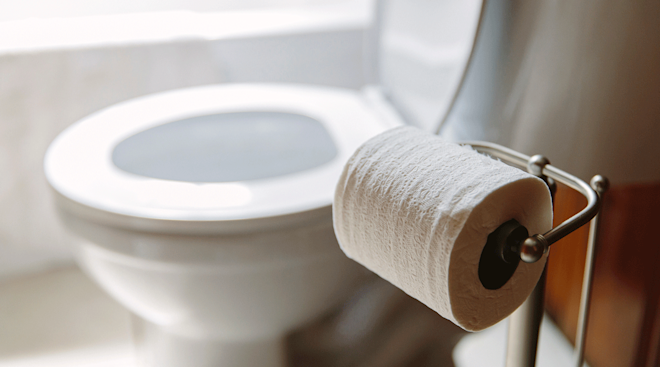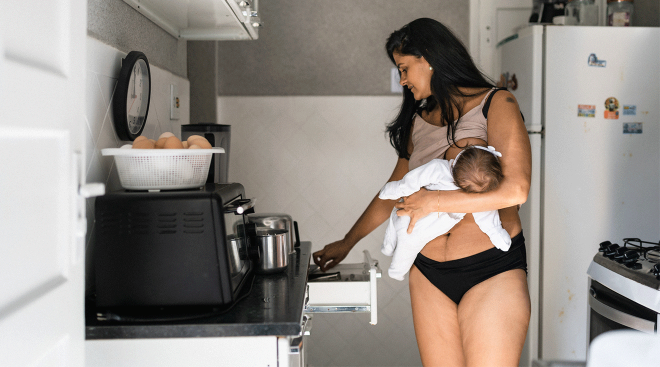One Minute to a Calmer You: 60-Second Self-Care Rituals for Parents
Every parent could use a breather. And while a trip to the spa or an hour-long yoga class both sound like lovely options, most moms and dads don’t have the time or ability to step away from their work, their families and their list of grown-up responsibilities.
But self-care isn’t a luxury, and it shouldn’t be treated like a bonus. Rather, it’s an essential ingredient in the recipe for creating a happier, healthier you. And the undeniable truth is that practicing self-care regularly can help you be your best parenting self—so do it for the kids! (Really, it’s the unselfish thing to do.)
Suffice it to say that the whole put-your-oxygen-mask-on-first metaphor—well, it applies. “By prioritizing ourselves, we make sure our cup is full. We extend our capacity for doing all the things, and we grow our frustration tolerance to handle parenting ups and downs,” says Christina Furnival, LPCC, a licensed mental health therapist and parenting blogger in California. If you’re not carving out moments for yourself, you may find yourself feeling depleted and resentful. And we can all acknowledge that “these feelings are not a good foundation for [our] best parenting.”
The good news for those short of time? You won’t have to rearrange your entire schedule or hire a babysitter to infuse moments of self-care into your busy days and nights. Don’t overthink it; just “make choices that bring you joy,” advises Furnival. Indulge in an afternoon latté or choose a foamy bubble bath over a shower every once in a while.
You can be busy and balanced. Got 60 seconds? That’s all it takes. Below, nine one-minute ways to seek joy, refuel your body and refill that proverbial cup.
Deep breathe for 60 seconds
Feeling agitated or anxious—but not sure why? Sometimes you need to take a break and a breath to ground yourself in the here and now. The great news about using breathwork as a form of self-care is that it’s easy, it’s free and you can do it anywhere. “Just stop, close your eyes and breathe deeply from the belly and back out for one minute,” says Kelly Smith, a yoga and meditation instructor and the founder of Yoga for You.
Smith suggests trying a “4-7-count breath.” Inhale for a count of four, and then exhale for a count of seven. “It helps to deactivate the sympathetic nervous system (fight or flight) and activate the parasympathetic nervous system (rest and digest),” explains Smith, adding that an extended exhale lets your body know that you’re safe and that it’s time to relax.
Do a yoga stretch
No time for an actual yoga class? No problem. Sporadic stretching can work wonders. Smith suggests trying a rag-doll forward fold with a chest expansion. “Stand with your feet slightly wider than hips’ distance,” she instructs. “Take your hands to your low back and clasp them together as you fold forward over your legs.” This introverted position can provide a quiet moment for reflection and relaxation—so it’s good for the body and the mind.
Move your body
Movement is medicine. And whether you’ve been slumped over a desk for hours or are feeling mentally exhausted from the mind-numbing effects of watching Cocomelon on repeat, a quick burst of exercise can boost your mood and energize your body. “It can help release endorphins, which feel good! Go ahead and bust out a few of your favorite dance moves,” suggests Renee Goff, PsyD, PMH-C, a clinical psychologist in Cincinnati, Ohio.
Light a candle
Lighting a candle can be a ritual of intention, so make this moment count; be present as you strike the match and ignite the wick. And since studies have found a strong connection between your sense of smell and mood, you’ll want to consider choosing a candle with a fragrance you enjoy. (According to research, lemon has a “stimulating” effect that can leave you feeling rejuvenated.)
Go outside for fresh air
Sometimes a change of venue is all you need. Cabin fever is real, and if you’re working from home or corralling toddlers all day, some fresh air and a new backdrop can work wonders to boost your mood and give your mind a mini vacation. Furthermore, research has found that being out in nature for as little as 40 seconds can sharpen your mental acuity. Step outside and let the sun shine on your face, or try an alfresco activity that engages the senses. “Identify five things you see, four things you feel, three things you hear, two things you smell and one thing you taste,” Furnival suggests.
Text a friend
If you’ve been feeling out of sorts these last few years (hello, COVID), you’re far from alone. You may be working from home, you’re taking care of cooped-up kiddos and everyday decisions feel heavy. Parenting—especially in the age of a pandemic—can be isolating. But a good old-fashioned vent session can help. And while you might not have the bandwidth for a lengthy gossip-filled phone call, you can probably muster up the energy and will to send a quick text to a friend. “One of our biggest human needs is companionship,” says Furnival. So reach out to someone you haven’t connected with in a long time (or someone who always makes you laugh) and strike up a conversation about anything and everything. It’ll make both of your days brighter.
Pet an animal
Need an oxytocin boost? Petting your beloved pup or kitty will not only give you a hearty dose of the “love” hormone, it’ll also lower your cortisol (stress hormone) level, says Furnival. “There’s a reason animals are used therapeutically for physical and mental health.” A moment with your furry best friend can help you feel the zen again.
Hug a loved one
“Hugs are powerful,” Furnival says. “Affectionate touch signals your brain to release serotonin, dopamine and oxytocin, which work together to help to improve your mood, create a feeling of well-being and happiness, decrease stress and loneliness and actually bolster your immune system.” What’s more, she notes that some research has shown that the longer the hug, the greater the benefits. A 60-second embrace? No one said your self-care couldn’t benefit a friend too!
Engage your senses
Anything you can do to change up one of your five senses can constitute self-care, says Goff, whether that’s “wrapping yourself in your favorite blanket, putting a warm or cold washcloth on your face [or] smelling your favorite perfume.” It all counts. Self-care is subjective; do what makes you feel good—that’s the whole point.
About the experts:
Christina Furnival, LPCC, is a licensed mental health therapist and parenting blogger in California. She earned her master of science in professional counseling degree from David Lipscomb University in Nashville, Tennessee.
Renée Goff, PsyD, PMH-C, is a licensed clinical psychologist and owner of Orchid Wellness & Mentoring in Cincinnati, Ohio. She received her doctor of psychology from Wright State University in Dayton, Ohio.
Kelly Smith is a yoga and meditation instructor and the founder of Yoga for You, where she offers virtual training, private lessons and yoga retreats.
Plus, more from The Bump:
Navigate forward to interact with the calendar and select a date. Press the question mark key to get the keyboard shortcuts for changing dates.





















































